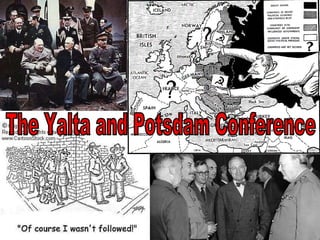The Yalta And Potsdam Conference
•Descargar como PPT, PDF•
11 recomendaciones•17,641 vistas
Denunciar
Compartir
Denunciar
Compartir

Recomendados
Más contenido relacionado
La actualidad más candente
La actualidad más candente (20)
CAMBRIDGE IGCSE HISTORY REVISION 2 - LEAGUE OF NATIONS

CAMBRIDGE IGCSE HISTORY REVISION 2 - LEAGUE OF NATIONS
03. SOVIET CONTROL OF EASTERN EUROPE: Country by country takeover

03. SOVIET CONTROL OF EASTERN EUROPE: Country by country takeover
HISTORY IGCSE CONTENT - 20TH CENTURY OPTION - USA CONTAINING COMMUNISM: VIETN...

HISTORY IGCSE CONTENT - 20TH CENTURY OPTION - USA CONTAINING COMMUNISM: VIETN...
CAMBRIDGE IGCSE HISTORY REVISION 6 - WHO WAS TO BLAME FOR THE COLD WAR - TRAD...

CAMBRIDGE IGCSE HISTORY REVISION 6 - WHO WAS TO BLAME FOR THE COLD WAR - TRAD...
Wemar Germany - germans' reaction to the treaty of versailles

Wemar Germany - germans' reaction to the treaty of versailles
Destacado (20)
CAMBRIDGE A2 HISTORY: POTSDAM CONFERENCE. THE ISSUES AND HOW THEY WERE RESOLV...

CAMBRIDGE A2 HISTORY: POTSDAM CONFERENCE. THE ISSUES AND HOW THEY WERE RESOLV...
Similar a The Yalta And Potsdam Conference
Similar a The Yalta And Potsdam Conference (20)
The Yalta And Potsdam Conference
- 1. The Yalta and Potsdam Conference
- 2. When it was clear that Germany was losing the European war, the Allied leaders met at Yalta to plan what would happen to Europe after Germany’s defeat. Cause of the Yalta Conference
- 4. War criminals who were responsible for the concentration camps would be hunted down. Countries liberated from the occupation of the German army would be allowed to hold free elections to choose the government they wanted. They would join the new United Nations organisations. Their aim was to keep peace after the war. Eastern Europe would be seen as ‘a soviet sphere of influence.’
- 5. They only disagreed about Poland. Stalin wanted the western border of the USSR to move into Poland but Churchill and Roosevelt did not. Stalin also said Poland could move its border into Germany.
- 6. Churchill knew that he could not do much because of Stalin’s Red Army that had control over Poland and eastern Germany. Churchill and Roosevelt agreed as long as the USSR did not to interfere in Greece where the British where trying to prevent the communists from taking over.
- 7. Cause of the Potsdam Conference
- 8. After Germany’s defeat, a second conference for the allied leaders was arranged. Many changes had taken place after Yalta. Stalin’s armies were occupying most of Eastern Europe because it was a defensive measure against future possible attacks. America had a new president, Harry Truman. The Allies had tested an atomic bomb.
- 9. They disagreed over what to do about Germany. They disagreed over reparations. Stalin wanted compensation from Germany because twenty million of his soldiers had died in the war but Truman did not. They disagreed over Soviet policy in eastern Europe.
- 10. After the Potsdam and Yalta conferences, Stalin achieved domination of eastern Europe. By 1946 Poland, Hungary, Bulgaria and Albania all had communist government that were loyal to Stalin. Churchill described the border between Soviet controlled countries and the west as an iron curtain.
- 11. THE END! By Rachel Roche, 10D.